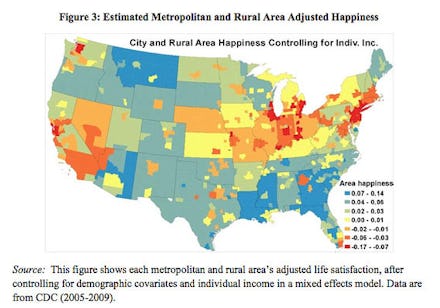The 5 Happiest Cities in America Are in the State You'd Least Expect

The news: According to a new working paper from professors at Harvard and the Vancouver School, the happiest cities in the United States are all in one place: Louisiana.
Using data from a CDC survey called the Behavioral Risk Factor Surveillance System, among other sources, and adjusted for age, sex, race, income and other factors, New Yorkers are the among the unhappiest people in the country. The five happiest, based off demographics and income, are Lafayette, Houma, Shreveport-Bossier City, Baton Rouge and Alexandria, all in the great state of Louisiana.
Other abnormally happy cities included Charlotte, N.C., and Naples, Fla. The unhappiest list included Scranton, Erie and Pittsburgh in Pennsylvania, Gary, Ind. and — wait for it — New York City.
The study: Part of the study's aim was to explain why many "unhappy" cities were still seeing population growth. If living in such miserable places is so terrible, why do people migrate to them?
"Self-reported unhappiness is high in [many] declining cities, and this tendency persists even when we control for income, race and other personal characteristics," the authors write. "Why are the residents of some cities persistently less happy? Given that they are, why do people choose to live in unhappy places?"
The report concludes that many of the unhappy cities have always been so according to limited data. Higher wages play a role in enticing people to move to unhappy places, as does lower housing costs. The authors wrote:
"Differences in happiness and subjective well-being across space weakly support the view that the desires for happiness and life satisfaction do not uniquely drive human ambitions. If we choose only that which maximized our happiness, then individuals would presumably move to happier places until the point where rising rents and congestion eliminated the joys of that locale. An alternative view is that humans are quite understandably willing to sacrifice both happiness and life satisfaction if the price is right. ... Indeed, the residents of unhappier metropolitan areas today do receive higher real wages — presumably as compensation for their misery."
But wait, I'm on the unhappy list! One of the study's authors, Harvard's Edward Glaeser, suggested in May that the happiness rankings weren't necessarily indicative of whether or not the cities were desirable places to live, because "thinking happiness is the be-all and end-all to judging how effective a municipality is operating for its citizens" is a mistake. Cities that are highly competitive might be less happy because citizens are constantly surrounded by people who are richer or more successful than them, such as New Yorkers. Larger cities may be less affordable and thus more stressful, but are also more productive and interesting. The happier places may just be safe but bland; it's a trade-off.